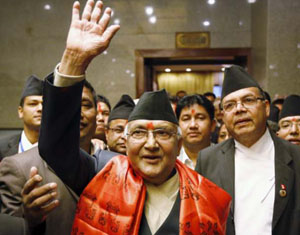March 23, 2016
BEIJING: In the background of strained relations with India over trade blockade
at India's borders following the Madhesi agitation, Nepal and China on Wednesday
issued a 15-point joint communique from Beijing which said they agreed to seal a
petrol trade deal.
“Both sides agreed to conclude a commercial deal on the supply of petroleum
products from China to Nepal,” the eighth point of the statement read, “In this
context, they encouraged companies to speed up negotiations and concerned
agencies to study providing supporting policies on issues of pricing, taxation,
transportation, quality control and customs and frontier formalities.”
 With the protracted agitation of the Madhesi community in the plains of Nepal
over special rights in the new Constitution, the only supply route via Indian border
for petroleum and other goods has been blocked for several months.
With the protracted agitation of the Madhesi community in the plains of Nepal
over special rights in the new Constitution, the only supply route via Indian border
for petroleum and other goods has been blocked for several months.
Several deals were also signed earlier by visiting Nepal Prime Minister KP Sharma
Oli and Chinese Premier Li Keqiang in Beijing on Monday. Among them, China has
agreed to conduct a feasibility study for exploration of oil and gas reserves in
Nepal. It has also offered Nepal access to a sea port for third-country trade, in a
rebuff to India. Nepal is currently using the port in Kolkata to export and import
goods to and from third countries.
However, Nepal can reap the benefits of trade via China only when that country
completes its planned new railway link to Nepal’s border at Kyirong (Gyrong). That
may materialise by 2020. The pacts included:
Nepal to use China’s sea port facility; Transit transport agreement to be reviewed
every 10 years; China to build a regional international airport in Pokhara; China,
Nepal exploring the possibilities of signing a bilateral free trade agreement;
China to explore the possibility of finding oil and gas reserves in Nepal; China to
distribute solar panels in Nepal’s rural areas by tapping its Climate Fund;
China to build, manage and maintain Xiarwa Boundary River Bridge at Hilsa,
Humla; Nepal, China to strengthen intellectual property system in both the
countries; Nepal, China to extend cooperation and exchange information on
banking regulations.